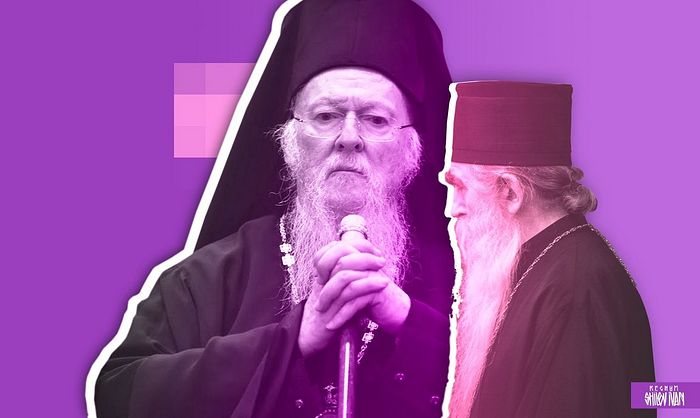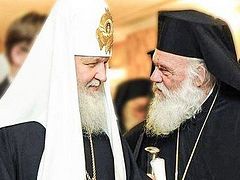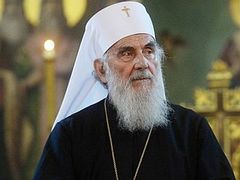Bačka, Serbia, October 22, 2019
In September 2018, His Grace Bishop Irinej of Bačka, the head of the Serbian Orthodox Church’s Information and Publishing Department, warned that the Patriarchate of Constantinople’s interference in the canonical territory of the Ukrainian Orthodox Church and its acceptance of schismatics will only lead to new schisms in the Church.
Even in May 2017, a year before the Patriarchate accepted Poroshenko’s plea for autocephaly, Bp. Irinej told His Eminence Metropolitan of Luke of Zaporozhye of the Ukrainian Church that he had personally warned Patriarch Bartholomew that cozying up to and supporting “Patriarch” Philaret Denisenko and his “Kiev Patriarchate” would lead the Church into a new schism.
As we know, Pat. Bartholomew did not heed his words, and Bp. Irinej was proven to be correct. After Constantinople officially restored the schismatics of the “Kiev Patriarchate” and the “Ukrainian Autocephalous Orthodox Church,” in their existing clerical ranks, without repentance, the Holy Synod of the Russian Church had to make the difficult decision to break communion with the Patriarchate of Constantinople.
And while certain hierarchs of the Greek Church have recently spoken against the Russian Church, blaming it for the break in communion, in a new statement published on the official site of the Serbian Orthodox Church, Bp. Irinej looks beyond who broke communion to the reasons why communion was broken, and states categorically, “the split was not caused by the Russian Orthodox Church, but solely by the Patriarchate of Constantinople.”
Further, he warns that the Greek Church could be responsible for deepening the schism, if it continues down the path it seems to be heading, having acted upon the desires of Constantinople and Washington, D.C.
Referring to the Liturgy concelebrated by Pat. Bartholomew and Archbishop Ieronymos of the Greek Church on Saturday in Thessaloniki, Bp. Irinej writes that, “On that occasion, the Archbishop of Athens, in his capacity as President of the Holy Synod in Athens (since the Greek Church has no primate, since Constantinople never acknowledged her true and full autocephaly), virtually acknowledged the so-called Orthodox Church of Ukraine,” by virtue of the fact that its primate, Epiphany Dumenko, was commemorated at the Liturgy.
Bp. Irinej writes that the Greek Church added Epiphany Dumenko to its diptychs, or list of primates who are commemorated. While this has been called into question, it nevertheless demonstrates the power of the spin that Constantinople is putting on the entire story involving the Greek Church: Pat. Bartholomew himself publicly thanked Abp. Ieronymos for adding Dumenko to the diptychs, though Abp. Ieronymos said nothing in response, remaining silent.
“This process is the final step before the abyss of an even deeper and more dangerous schism in ecumenical Orthodoxy,” the Serbian hierarch warns, referring to the Russian Holy Synod’s announcement that if Abp. Ieronymos begins to recognize the schismatics, then Patriarch Kirill will cease to commemorate him, and that the Russian Church will not have communion with any Greek hierarchs who support Constantinople’s lawlessness by recognizing the OCU.
However, despite the aggression against it, the Moscow Patriarchate has remained calm and patient. “Knowing how much responsibility, sobriety, reasoning, and patience the Moscow Patriarchate has shown since facing this terrible challenge, I assume that it will not make this decision—fundamentally accepted and publicly announced—until Abp. Ieronymos of Athens allows himself to serve with Mr. Dumenko, the false metropolitan of Kiev,” Bp. Irinej writes.
Bp. Irinej’s assessment is correct, as Fr. Nikolai Balashov, the Deputy Chairman of the Moscow Patriarchate’s Department for External Church Relations, commented that the Russian Church does not consider that Abp. Ieronymos yet recognizes the OCU, because it was Pat. Bartholomew who commemorated Epiphany at the Liturgy on Saturday.
The schism was in no way caused by the Russian Church, Bp. Irinej continues, but solely by Constantinople, and responsibility for its possible deepening and extension will be borne by the Greek Church which, after a period of resistance, has capitulated to “the instructions of the Phanar, Washington, and God knows who else.”
However, thankfully, it is not too late, Bp. Irinej believes: “Abp. Ieronymos still has room for maneuver, to stop and not contribute to an even greater and more difficult schism in the Orthodox Church.”
It is never superfluous to remind ourselves and others of the Patristic teaching that even martyrdom cannot wash away the sin of schism, he continues.
If Abp. Ieronymos does not turn from the path he is currently on, he “will share responsibility before God, the Church and history, with Patriarch Bartholomew,” Bp. Irinej believes. Further, Pat. Bartholomew “unfortunately forgets that he is primarily the Bishop of Constantinople, today in Istanbul, and that the title ‘Ecumenical Patriarch’ actually means the first bishop of the Byzantine ‘ecumene,’ as the official ideology called the Roman or Eastern Roman Empire, not the ‘bishop of all the universe’ or planet Earth, as the modern innovative—and I’ll say it bluntly—non-Orthodox ecclesiastical ideology of the Ecumenical Patriarchate.”
The attitude of the Serbian Church remains unchanged, Bp. Irinej affirms: “We do not recognize the unrepentant Ukrainian schismatics as members of the Church, much less as a normal autocephalous Orthodox Church.”




